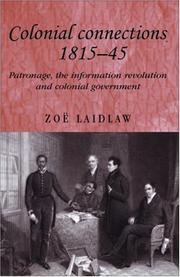| Listing 1 - 3 of 3 |
Sort by
|

ISBN: 9781847794406 1847794408 0719069181 9780719069185 1784990000 Year: 2005 Publisher: Manchester, U.K. New York New York Manchester University Press Distributed exclusively in the USA by Palgrave
Abstract | Keywords | Export | Availability | Bookmark
 Loading...
Loading...Choose an application
- Reference Manager
- EndNote
- RefWorks (Direct export to RefWorks)
This groundbreaking book challenges standard interpretations of metropolitan strategies of rule in the early nineteenth century. After the Napoleonic wars, the British government ruled a more diverse empire than ever before, and the Colonial Office responded by cultivating strong personal links with governors and colonial officials through which influence, patronage and information could flow. By the 1830's the conviction that personal connections were the best way of exerting influence within the imperial sphere went well beyond the metropolitan government, as lobbyists, settlers and missionar
Great Britain --- Colonies --- Administration --- History --- British government. --- British historiography. --- British imperialism. --- colonial governance. --- colonial lobbyists. --- governors. --- historical networking. --- imperial administration. --- imperial policies. --- information networks. --- information revolution. --- metropolitan politics. --- patronage networks. --- personal communications. --- private correspondence. --- unofficial correspondence.
Book
ISBN: 0520284232 0520959868 9780520959866 9780520284227 0520284224 9780520284234 Year: 2015 Publisher: Oakland, California
Abstract | Keywords | Export | Availability | Bookmark
 Loading...
Loading...Choose an application
- Reference Manager
- EndNote
- RefWorks (Direct export to RefWorks)
The revolution that brought the African National Congress (ANC) to power in South Africa was fractured by internal conflict. Migrant workers from rural Zululand rejected many of the egalitarian values and policies fundamental to the ANC's liberal democratic platform and organized themselves in an attempt to sabotage the movement. This anti-democracy stance, which persists today as a direct critique of "freedom" in neoliberal South Africa, hinges on an idealized vision of the rural home and a hierarchical social order crafted in part by the technologies of colonial governance over the past century. In analyzing this conflict, Jason Hickel contributes to broad theoretical debates about liberalism and democratization in the postcolonial world. Democracy as Death interrogates the Western ideals of individual freedom and agency from the perspective of those who oppose such ideals, and questions the assumptions underpinning theories of anti-liberal movements. The book argues that both democracy and the political science that attempts to explain resistance to it presuppose a model of personhood native to Western capitalism, which may not operate cross-culturally.
Democracy --- South Africa --- Politics and government --- african history. --- african national congress. --- anc. --- anti democracy stance. --- colonial governance. --- colonialism. --- cultural studies. --- democratization. --- diplomacy. --- egalitarian values. --- freedom. --- government and governing. --- hierarchical social order. --- historical. --- individual freedom. --- internal conflict. --- liberal democratic platform. --- liberalism. --- migrant workers. --- migrants. --- neoliberal south africa. --- postcolonial studies. --- revolution. --- rural home. --- rural zuzuland. --- rural. --- south africa. --- south african history. --- western capitalism. --- western ideals.
Book
ISBN: 9781787446809 9781847012432 1847012434 1787446808 1800103352 Year: 2022 Publisher: Woodbridge, England : James Currey,
Abstract | Keywords | Export | Availability | Bookmark
 Loading...
Loading...Choose an application
- Reference Manager
- EndNote
- RefWorks (Direct export to RefWorks)
Between 2012 and 2016 several Muslim clerics were murdered in Uganda: there is still no consensus as to who was responsible. In this book Joseph Kasule seeks to explain this by examining the colonial and postcolonial history of the Muslim minority and questions of Muslim identity within a non-Muslim state. Challenging prevalent scholarship that has homogenized Muslims' political identity, Kasule demonstrates that Muslim responses to power have been varied and multiple. Beginning with the pre-colonial political community in Buganda, and Muteesa I's attempted Islamization of the country using Islam as a centralizing ideology, the author discusses how the political status of Islam and Muslims in Uganda has been defined under successive regimes.
Africa, East --- Islam --- History --- Religion --- Muslims --- Crimes against --- Uganda --- Religion. --- Uganda. --- Abdul Hakim Ssentamu. --- Allied Democratic Forces (ADF). --- Captain Frederick D. Lugard. --- Colonial governance. --- Governance. --- Idi Amin. --- Islam in pre-colonial Buganda. --- Islam. --- Islamization of Buganda. --- Jamil Mukulu. --- Kabaka Muteesa I. --- Multifurcated society. --- Murder of Muslim clerics. --- Muslim minority. --- Muslims. --- Mwera Agreement. --- Prince Nuhu Mbogo. --- Salafism. --- Secularism. --- Statecraft. --- Taligh. --- Uganda Muslim Supreme Council. --- Yoweri Kaguta Museveni. --- governmentality.
| Listing 1 - 3 of 3 |
Sort by
|

 Search
Search Feedback
Feedback About UniCat
About UniCat  Help
Help News
News